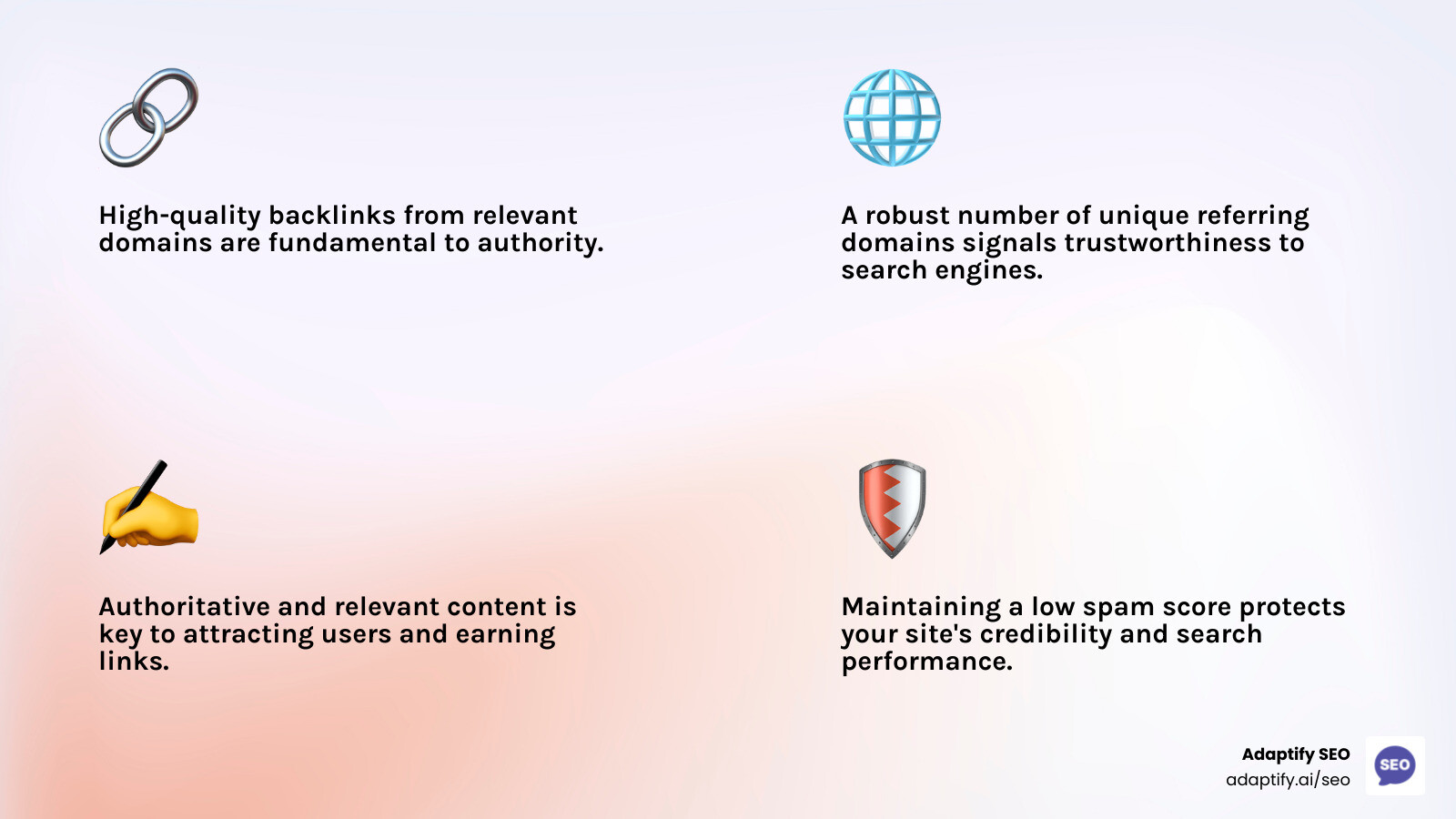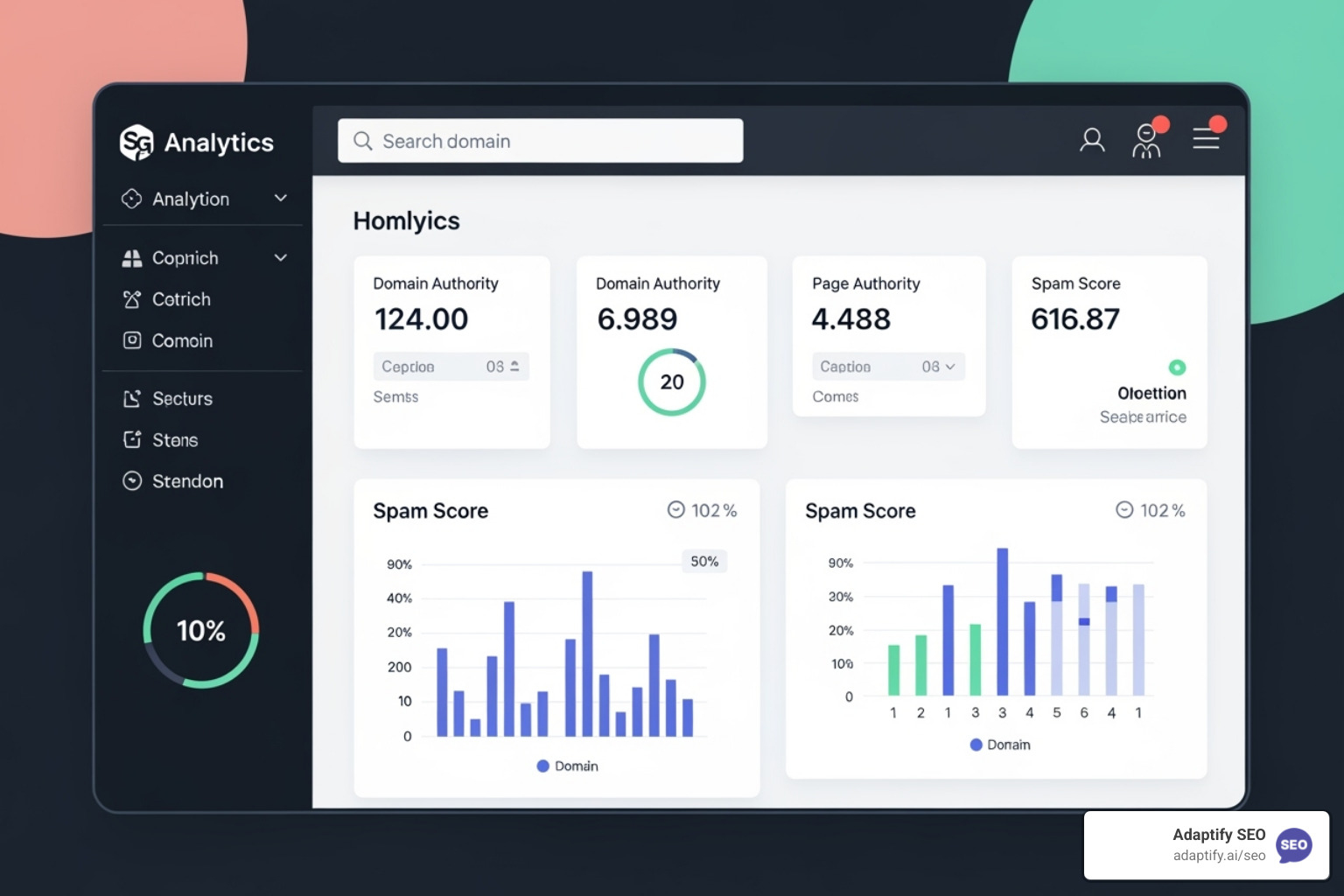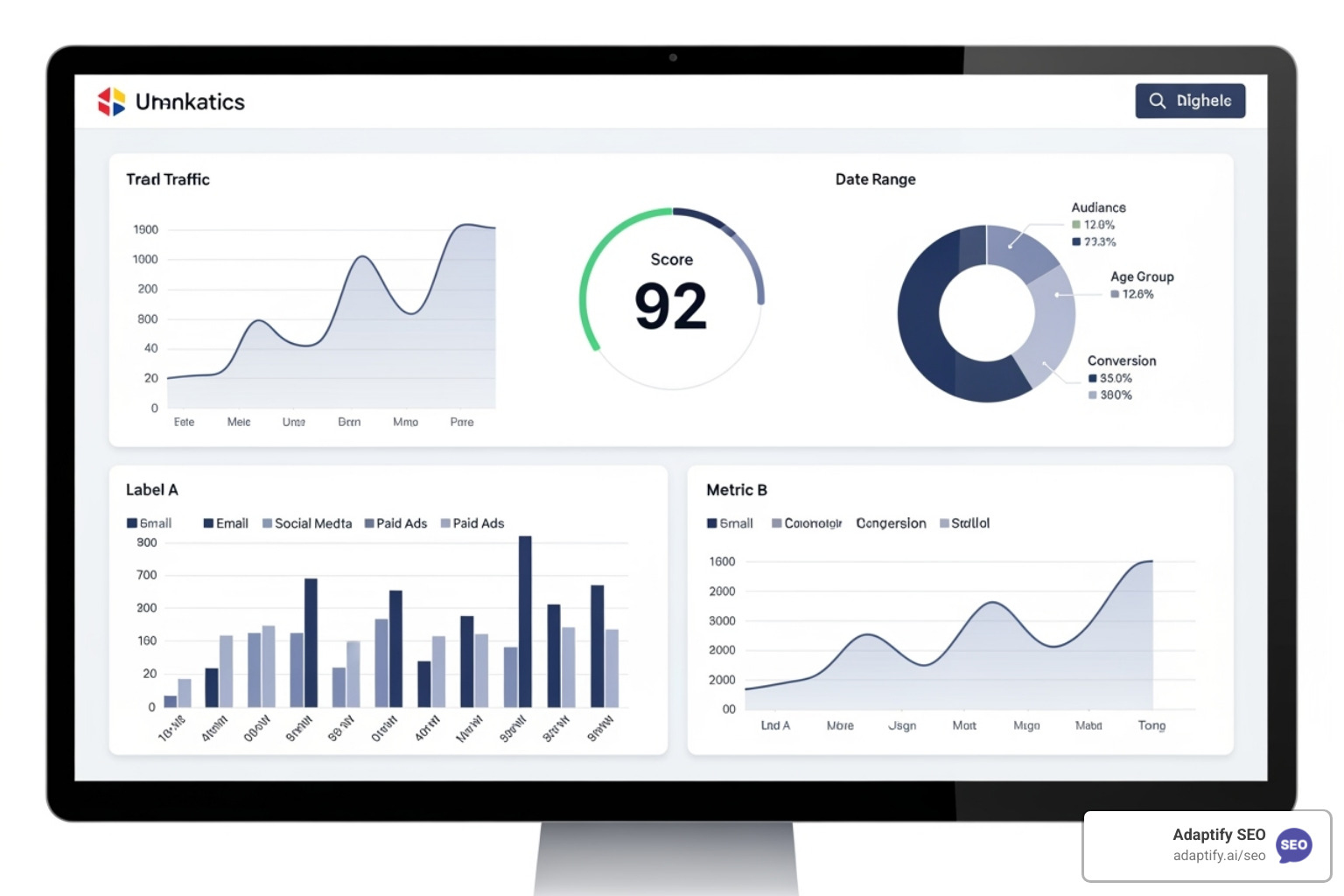Who's the Boss? A Roundup of Website Domain Authority Checkers
Hansjan Kamerling
Nov 25
What is Website Authority and Why Should You Care?

A website domain authority checker is a tool that estimates your site's potential to rank in search results. It analyzes factors like backlinks and domain strength to generate a score. Here are the top free and paid options:
Best Website Domain Authority Checkers:
- Moz Free Domain Authority Checker - The original DA metric (0-100 scale), includes spam score
- Ahrefs Website Authority Checker - Domain Rating (DR) based on backlink quality
- Semrush Authority Score Checker - Authority Score (AS) considering link power and spam factors
- SmallSEOTools DA PA Checker - Free bulk checker for DA and PA scores
- Majestic - Trust Flow and Citation Flow metrics
- Rankifyer - Aggregates scores from Moz, Ahrefs, and Semrush
- SiteProfiler by Mangools - Combined DA, PA, and backlink data
- Serpstat - DA checking with rank tracking features
Website authority is a measure of your domain's overall SEO strength. While Google doesn't use these third-party metrics directly, they correlate strongly with search performance. A higher authority score suggests your pages are more likely to rank for competitive keywords.
This matters because authority scores help you understand where you stand against competitors. If top-ranking sites for a keyword have DA scores in the 70s while yours is 35, you know you need a stronger backlink and content strategy. These metrics also help identify valuable link-building opportunities.
The concept traces back to Google's PageRank algorithm, which evaluated sites based on their link networks. When Google stopped publicizing PageRank scores, SEO tools like Moz developed their own metrics to fill the gap. Today's scores use machine learning and consider dozens of signals, from referring domains to content quality.
I'm Hansjan Kamerling, and I've spent years helping businesses optimize their search visibility. In this guide, I'll walk you through the top authority checking tools and how to use them to scale your SEO efforts.

The Origins of Authority: From PageRank to Modern Metrics
The idea of "website authority" began with a 1999 research paper on mapping the web based on links. Soon after, Google introduced its but confidential PageRank algorithm, which treated links as votes of confidence. As Google made PageRank less transparent, with officials like Matt Cutts warning against trying to manipulate it in a 2009 blog post, the SEO industry needed a new way to estimate a site's strength.
This led to proprietary metrics like Domain Authority (DA) from Moz, Domain Rating (DR) from Ahrefs, and Authority Score (AS) from Semrush. These tools use machine learning to analyze factors Google values, such as backlink profiles and content quality. While Google's own ranking systems guide doesn't mention these terms, the metrics are excellent indicators of a site's SEO health.
Why Authority is a Cornerstone of SEO Strategy
Authority scores are a cornerstone of SEO strategy because they provide a powerful lens for viewing the competitive landscape. A strong score is like a strong reputation—it signals trust and influence.
- Competitive Analysis: A website domain authority checker lets you benchmark your domain against competitors. Knowing their scores helps you gauge the effort needed to outrank them.
- Search Visibility: Higher authority scores correlate with a greater likelihood of ranking well in organic search. The underlying factors that boost authority (quality backlinks, strong content) are crucial for Google.
- Trustworthiness and Credibility: Authority metrics act as a proxy for how trustworthy a site is. High authority signals to Google that you're a reliable source, which can lead to better SERP performance.
- Strategic Planning: Understanding authority helps in setting realistic SEO goals. A new site with low authority should focus on foundational link building and content, rather than competing directly with industry giants.
The Top 8 Website Domain Authority Checker Tools
Now that we've established what website authority is and why it matters, let's dive into the tools that measure it. These checkers help you diagnose your site's competitive strength and identify opportunities for improvement.
1. Moz Free Domain Authority Checker
Moz pioneered third-party authority metrics, and their Domain Authority (DA) is the industry standard. It's a 0-100 score predicting how likely a site is to rank, based on over 40 signals with an emphasis on linking domains.

The Moz Free Domain Authority Checker provides a domain's DA, Page Authority (PA), and Spam Score. The Spam Score is useful for flagging potentially risky sites (a score below 30% is considered healthy). The free version is great for quick checks, while Moz Pro offers bulk analysis and deeper data on linking root domains.
2. Ahrefs Website Authority Checker
Ahrefs uses Domain Rating (DR), a 0-100 metric focused almost exclusively on backlink quality and quantity. It measures the number of unique domains linking to your site and their authority.
The Ahrefs Website Authority Checker is ideal for analyzing a site's backlink profile. Research shows a strong correlation between DR and keyword rankings, with the number of referring domains being a key factor. Ahrefs also offers URL Rating (UR) for individual page strength. DR doesn't include spam signals or traffic data; it's purely about links.
3. Semrush Authority Score Checker
Semrush's Authority Score (AS) provides a more holistic view. Updated in 2023, this 0-100 metric is designed to resist manipulation by considering links, organic traffic, and spam factors.

The Semrush Authority Score Checker is valuable because it incorporates organic traffic with link power, revealing if a site attracts visitors or just accumulates links. Semrush uses AI to detect suspicious patterns, like an unnatural ratio of links to traffic. A score of 60 is considered a benchmark for a site with a "great backlink profile and niche relevance."
4. SmallSEOTools Domain Authority Checker
The SmallSEOTools Domain Authority Checker is a popular free option for quick results. It provides Moz's DA and PA scores, along with metrics like Moz Rank and Spam Score.
This free tool is perfect for assessing multiple URLs without logging into a paid platform, allowing up to 5 URLs at once. Pro plans increase this limit for users needing to check domains in bulk. Their Try DA Pro plan is an accessible option for those needing higher volume.
5. Majestic
Majestic offers two unique metrics: Trust Flow and Citation Flow. Instead of a single score, this pair provides a nuanced view of a backlink profile. Trust Flow measures backlink quality, while Citation Flow measures quantity.
Majestic's Topical Trust Flow is especially valuable, as it categorizes sites by niche, showing if a domain has genuine topical authority. The Historic Index is another key feature, revealing how a domain's link profile has evolved, which helps gauge whether its authority is growing or stagnant.
6. Rankifyer
Rankifyer aggregates data from multiple sources instead of creating its own metric. It combines scores from Moz DA, Ahrefs DR, and Semrush AS to give a comprehensive view of website authority.
Rankifyer's Free Domain Authority Checker calculates a median value score, reducing the bias of relying on a single algorithm. This multi-source aggregation is useful for presenting a robust analysis to clients. According to Rankifyer, scores above 50 are good, and above 70 are excellent.
7. SiteProfiler by Mangools
Mangools' SiteProfiler is part of a user-friendly SEO suite. Its website domain authority checker presents Moz's DA and PA alongside Majestic's Citation Flow and Trust Flow in a clean, intuitive dashboard.
SiteProfiler is great for beginners or clients who need to understand their competitive position without being overwhelmed by technical data. It also includes backlink analysis, showing where a site's authority comes from and which pages attract the most link equity.
8. Serpstat
Serpstat is a comprehensive platform that integrates its Domain Authority Checker with other SEO tools like backlink analysis and rank tracking. This makes it a complete competitive intelligence solution.
Serpstat is valuable for quickly assessing competitor domains, identifying their top pages, and seeing how their authority correlates with actual keyword rankings. This provides actionable insights for strategy development beyond just a simple authority score.
Understanding the Scores: DA vs. DR vs. AS
Different tools give you different authority scores because they all use different recipes to measure the same concept: your website's ranking potential. Think of them as three critics reviewing the same restaurant; each focuses on different aspects, but all perspectives are useful.
Let's break down the key differences.
Domain Authority (DA) from Moz is the most widely recognized metric. It uses a logarithmic scale from 0 to 100, meaning it's harder to improve your score as you climb. DA is calculated using over 40 signals, with a heavy emphasis on linking root domains and total links, to predict overall ranking potential.
Domain Rating (DR) from Ahrefs is laser-focused on your backlink profile. Also on a 0-100 logarithmic scale, it measures the strength and quantity of your referring domains. DR intentionally excludes factors like link spam, traffic, or domain age to provide a pure measure of backlink strength.
Authority Score (AS) from Semrush offers a holistic view by combining link power, organic traffic, and spam factors. Updated in 2023 to be more resistant to manipulation, it uses AI to detect suspicious patterns, like an imbalance between links and traffic. A score of 60 is considered a solid benchmark for niche relevance.
Here's a quick comparison:
| Metric | Provider | Scale | Key Factors | Primary Focus |
|---|---|---|---|---|
| Domain Authority (DA) | Moz | 0-100 (logarithmic) | 40+ signals including linking root domains, total links, MozRank, MozTrust | Comprehensive prediction of ranking potential |
| Domain Rating (DR) | Ahrefs | 0-100 (logarithmic) | Number of unique referring domains and their authority | Pure backlink profile strength |
| Authority Score (AS) | Semrush | 0-100 | Link power, organic traffic, spam factors | Holistic quality and manipulation resistance |
Which one should you use? I recommend checking at least two. Each provides a different angle. For example, a high DA but low DR might indicate a weak backlink profile despite other positive SEO signals. These are third-party scores that correlate with Google's ranking factors, making them useful for strategic planning, but they are not used by Google itself.
What is a Good Website Authority Score?
This is the million-dollar question, and the answer is: it depends. A good score is relative to your niche and competitors.
A local bakery with a DA of 35 might be outranking all local competitors. However, that same score would be insignificant in the personal finance niche, where top sites have DAs in the 90s.
Your niche's competitiveness is everything. To define a "good" score, benchmark against your direct competitors. Use a website domain authority checker to analyze the top sites ranking for your target keywords. Their average score is your target. If they average a DA of 55 and you're at 30, you have your goal. If you're already matching them, you're in a strong position.
As a general guideline:
- Moz DA: 50-60 is good, and above 60 is excellent.
- Ahrefs DR: Above 50 is solid, and above 70 is excellent.
- Semrush AS: A score of 60 indicates a "great backlink profile and is niche relevant."
What truly matters is tracking your progress over time. Consistent growth is more valuable than hitting an arbitrary number. Authority building is a marathon, not a sprint.
The Difference Between Domain Authority (DA) and Page Authority (PA)
Let's clear up this common point of confusion. The difference is simple:
- Domain Authority (DA) measures the predictive ranking strength of your entire website (e.g.,
www.yoursite.com). It's a site-wide score reflecting the cumulative authority of all your pages and backlinks.
- Page Authority (PA) measures the strength of a single, specific page (e.g.,
www.yoursite.com/blog/amazing-article). Each page on your site has its own PA score.
Think of DA as a university's overall reputation and PA as the reputation of a specific department within it. A high DA gives all your pages a head start, but their individual PA scores will vary. Your homepage might have a PA of 60, while a new blog post has a PA of 25. This is normal.
When analyzing competitors, check both metrics. You might find that while a competitor's domain has a higher DA, the specific page you're targeting has a PA you can realistically compete with. Most website domain authority checker tools, including the Page Authority Checker from SmallSEOTools, will show both scores.
Frequently Asked Questions about Website Authority
Does website authority directly impact Google rankings?
No, website authority metrics like DA, DR, and AS do not directly impact Google rankings. They are third-party metrics created by SEO tool companies. Google has its own confidential, internal scores and does not use these public-facing metrics, as confirmed by Google representatives and its ranking systems guide.
However, there is a strong correlation between high authority scores and good rankings. The factors that boost your authority score—a strong backlink profile, high-quality content, and solid technical SEO—are the same factors Google values. So, while Google doesn't check your DA score, improving the elements that contribute to it will naturally lead to better rankings. Think of authority scores as useful indicators of SEO health, not direct ranking factors.
How long does it take to improve domain authority?
Improving domain authority is a long-term commitment that typically takes months or even years. The timeline depends on your starting point, your niche's competitiveness, and the consistency of your efforts.
Authority metrics use a logarithmic scale, meaning it's much harder to go from a DA of 70 to 80 than from 20 to 30. Building authority requires consistent, high-quality work. Sporadic efforts won't move the needle.
Quality always beats speed. Avoid sketchy link schemes that promise quick wins; they often lead to penalties. Lasting authority is built by earning natural backlinks from relevant sources and creating genuinely helpful content.
Focus on the process: create content that deserves to rank, build relationships that lead to natural links, and maintain strong technical SEO. The authority score will follow. SEO is a marathon, and the winners are those who keep running.
How do I use a website domain authority checker to find link-building opportunities?
A website domain authority checker is an excellent tool for building an actionable link-building strategy. Here’s a practical approach:
- Analyze Competitor Backlinks: Identify who ranks for your target keywords and run their URLs through an authority checker. This gives you a baseline. Then, dive into their backlink profiles to find high-authority sites linking to them but not to you. These "link gaps" are prime opportunities.
- Vet Guest Posting Sites: Before pitching, run every potential guest post site through a checker. Set a minimum threshold (e.g., DA 30+ or DR 40+), but also verify its topical relevance and organic traffic. A high score on an irrelevant site is worthless.
- Find Resource Pages: Search for phrases like "your niche + resources." These pages are designed to link out to valuable content. Use your checker to identify high-authority resource pages and pitch your content as a worthy addition.
- Claim Unlinked Mentions: Use monitoring tools to find mentions of your brand that don't include a link. If the mentioning site has good authority, a polite email asking for a link can be an easy win.
- Use Broken Link Building: Find dead outbound links on high-authority sites in your niche. If you have relevant content, reach out to the site owner, report the broken link, and offer your page as a replacement.
By systematically using these methods, you can turn abstract authority scores into a concrete roadmap for building a strong backlink profile. To streamline and scale this process, Adaptify.ai offers automated solutions. More info about our backlink services shows how we help agencies scale link-building while maintaining quality.
From Metrics to Mastery: Automate Your Authority Building
We've covered website authority, from its origins to the metrics used by today's website domain authority checker tools. The key takeaway is that while these scores aren't direct ranking factors, they are indispensable for gauging SEO health and competitive standing. Building authority requires consistent effort, strategic link building, and high-quality content.
For agencies, managing this process is time-consuming. This is where automation is a game-changer. At Adaptify.ai, we specialize in automating SEO services for agencies, streamlining everything from strategy and content creation to PR link building. Our AI-powered platform helps you identify link opportunities, craft authoritative content, and automate outreach, allowing you to focus on strategy and client relationships.
Ready to move from tracking metrics to mastering them with the power of automation? Explore how Adaptify.ai can help your agency drive real results for your clients.
4. Search Atlas Free DA Checker
Domain Power; Bulk analysis; AI automation; Backlink analysis; Optimize with Search Atlas for Free
5. SmallSEOTools Domain Authority Checker
Bulk DA PA Checker; Moz Rank; Spam Score; Free tool; Try DA Pro
6. Majestic
Trust Flow; Citation Flow; Topical Trust Flow; Historic Index
7. Rankifyer
Multi-source aggregation; Median value score; Moz DA; Ahrefs DR; Semrush AS; Free Domain Authority Checker
8. SiteProfiler by Mangools
DA; PA; Citation Flow; Trust Flow; Backlink analysis
9. Serpstat
Domain Authority Checker; Backlink analysis; Rank tracking
Understanding the Scores: DA vs. DR vs. AS
This section clarifies the differences between the main authority metrics from the top SEO platforms.
[TABLE] comparing Moz's DA, Ahrefs' DR, and Semrush's AS, including calculation factors, scale, and primary focus; Logarithmic scale; Machine learning; Link power; Backlink quality
What is a Good Website Authority Score?
Relative metric; Niche competitiveness; Benchmarking; Score ranges (e.g., 50-60 is good); Competitor scores
The Difference Between Domain Authority (DA) and Page Authority (PA)
Domain-level strength; Page-level strength; Ranking potential of a single page; Page Authority Checker
How to Improve Your Website's Authority
This section provides actionable strategies for boosting a site's authority score.
[IMAGE] of a high-quality backlink profile in an analysis tool; Link building; Content marketing; On-page SEO; Technical SEO
Build a High-Quality Backlink Profile
Referring domains; Link quality vs. quantity; .edu and .gov links; Link-building opportunities; More info about our backlink services
Create Authoritative and Helpful Content
Content quality; User intent; E-E-A-T; Topical relevance; Evergreen content; More info about our content services
Using a Website Domain Authority Checker for Competitive Analysis
Benchmarking; Identifying link gaps; Content strategy insights; Vetting link prospects
Frequently Asked Questions about Website Authority
Does website authority directly impact Google rankings?
No, it's a third-party metric; Correlation vs. causation; Google's sitewide scores; Focus on quality signals
How long does it take to improve domain authority?
Months or years; SEO is a marathon; Consistency; Quality over speed
How do I use a website domain authority checker to find link-building opportunities?
Analyze competitor backlinks; Vet potential guest post sites; Set minimum authority thresholds for outreach
From Metrics to Mastery: Automate Your Authority Building
Recap of authority's importance; Consistent effort; Strategic SEO; Adaptify.ai for agencies; Automation; See our case studies

